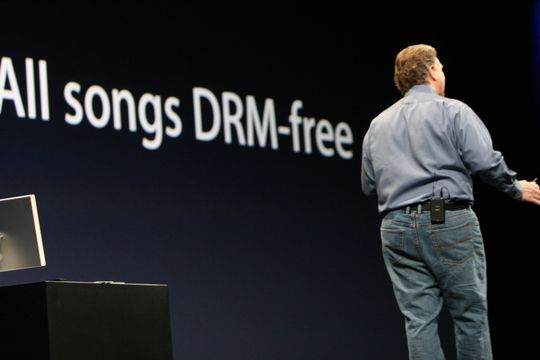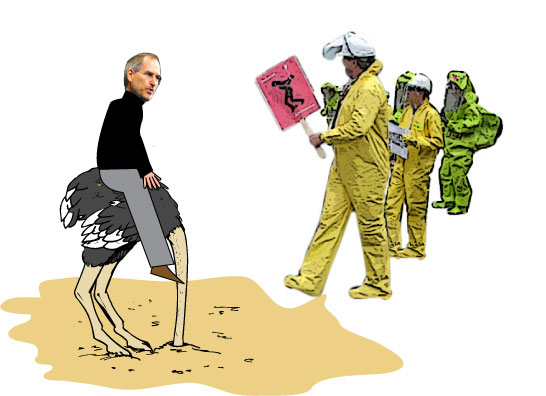Microsoft defends DRM, badly
While others are waking up to the problems with DRM and moving away from it, Microsoft is embracing and defending it.
Do they think we forgot about MSN Music already?
I buy these songs on your service - and they're locked to my phone - what happens when I upgrade my phone in six months' time?
Well, I think you know the answer to that.
Day 35 -- DRM in 2008
With our 35 Days Against DRM campaign ending, how about a 2008 recap to end things off...
Apple
In 2008, Apple released the iPhone 3G, new iPods and the new MacBook with an HDMI display output. A persistent rumor finally came true at the early 2009 MacWorld -- iTunes is now going DRM free, at least for music. Movies, TV shows, Audiobooks and Applications remain encumbered by DRM.
Day 34 - MOB TV
Koh Choon Lin writes:
I am very frustrated by my local media provider, MOBTV, who provides video-on-demand service. It is a subscription-based service that provides viewers with immediate access to their favorite programmes.
Day 33 - Blu-Ray and the PlayStation 3
Day 32 -- RIAA
The RIAA has changed its tactic. No longer will they sue random people for file sharing. Now they're going after the ISPs. While many of the large media company ISPs such as AOL, Comcast, etc., will almost certainly comply, what will the smaller, independent ISPs do? How will large telcos like Verizon react?
Internet News reports:
Day 31 -- Bono
Early on the campaign, we began an open letter to Bono, asking him to stand with us in calling for the elimination of DRM. Seven thousand people signed that petition and wrote messages asking him to support the cause. We have been in contact with Bono and his "people" at various points in the past, and have been told that he will not respond, and that we should accept this as a rejection of our appeal.
Day 30 -- "Trusted" Computing
Who should your computer take its orders from? Most people think their computers should obey them, not obey someone else. With a plan they call "trusted computing", large media corporations (including the movie companies and record companies), together with computer companies such as Microsoft and Intel, are planning to make your computer obey them instead of you.
Continue reading 'Can you trust your computer?' by Richard Stallman
Day 29 -- Edgar Bronfman, Warner Music
The notion that music does not deserve the same protection as software, film, video games or other intellectual property, simply because there is an unprotected legacy product in the physical world, is completely without logic or merit.
Nothing like a crazy quotation to open an article...
This at a time when even Apple had publicly declared their distaste for DRM on music. Of course, that took them about two years to realistically implement, but they weren't the only ones saying it.
Day 28 -- Digital Copy
A recent tactic, in an effort to stop people downloading movies from the Internet, is the "Digital Copy" -- an extra disk containing an iTunes or Windows Media DRM copy of the movie, which can be copied to a supported DRM-player, such as the iPod or Zune.
We've had a few people write in and tell us more about the Digital Copy...
The Windows Media version allows for playback on exactly ONE computer and can only be transferred to said computer ONCE. In one case I accidentally deleted the video in question. Now it is gone for good.
Americans! Let the FCC know how you feel about DRM...
DRM refers to technologies typically used by hardware manufacturers, publishers, and copyright holders to attempt to control how consumers access and use media and entertainment content. Among other issues, the workshop will address the need to improve disclosures to consumers about DRM limitations. Interested parties may submit written comments or original research on this topic.
If you're in the USA, please submit your own response.
Apple announces all music on iTunes to go DRM-free -- no word on movies, TV shows, games, audiobooks and applications
As you've no doubt heard, Apple, the last major retailer of DRM-encumbered music announced, live at MacWorld, that all iTunes music will be going DRM-free. Today, some 8 million songs and music videos are already available DRM-free, via iTunes Plus.

Belgian anti-DRM petition
Day 27 -- Steve Ballmer and Bill Gates
Not content with producing a DRM-laden operating system in Vista, Bill Gates and Steve Ballmer have been hard at work, producing the Zune -- yet another piece of Redmond junk you wouldn't want in a million years. Not only do they seemingly fail to get it, repeatedly, but Microsoft under their leadership continues to produce overly fascist products, such as the Windows Media Center -- implementing the Broadcast Flag at the whim of NBC, one of their media partners.
Day 26 -- ACTA
ACTA, the Anti-Counterfeiting Trade Agreement, is a proposed enforcement treaty between United States, the European Community, Switzerland, Japan, Australia, the Republic of Korea, New Zealand and Mexico, with Canada set to join any day now.
Day 25 -- Biden and Leahy
Senator Patrick Leahy of Vermont -- paid puppet for the media industry, sponsored the controversial S.3325 bill, aka the "PRO IP" bill.
We've covered the bill in some detail already:-
Day 24 -- SDMI
SDMI, the Secure Digital Music Initiative was one of the first modern DRM schemes came about ten years ago -- a direct response to the widespread success of the DRM-free MP3 file format.
SDMI would use a watermarking feature and wanted to ensure this could not be detected. As such, they announced a challenge, inviting hackers and crypto experts to remove the watermarking.
Day 23 -- Erik Huggers
The man who took over from Ashley Highfield had a tough job -- it wouldn't be easy filling his shoes. Afterall, Highfield's baby, the iPlayer, was already a failure by the time he arrived, it really had no chance of succeeding, especially for a Microsoft player like Huggers.
As it stands now, Highfield is at Microsoft, presumably working hard to combat all 600 of the GNU/Linux users in the UK, and as such as offer this hastily-drawn and poorly-concieved look into Erik Huggers' first day at the BBC.
Day 22 -- TiVO
When we told you about the iPhone, one of the problems we listed was that iPhone implements what we refer to as 'tivoization' -- that is, refusing to run software that has not been deemed appropriate by the ruling body, even if the software is permitted to be changed, legally, by its developers.
Day 21 -- HD-DVD
Oh nine! F nine! One one Zero. 29D! 74E! Thirty Five! Bee Dee! Eight Four Thousand, One Hundred and Fifty Six. The Sinclair C5. When I'm 63. Oh, to be 56. Two Fat Ladies. Sea? Zero.
Confused holiday ramblings from Defective by Design or the key to something bigger? It's all part of something called the AACS encryption key controversy -- way back in April 2007, the MPAA and its cronies sent takedown notices to websites which dared to feature the magic number.
Day 20 -- Vista
Here at DefectiveByDesign we have been working towards the goal of making Digital Restrictions Management (DRM) a socially unacceptable technology practice. That message is spreading.
By highlighting the threat DRM posses not just to consumer rights but to our freedom to be in control of our computers and electronic devices, we have been able to gain widespread political support.
Day 18 -- DMCA
As we mentioned briefly yesterday -- we should never forget that Adobe used the Digital Millennium Copyright Act (DMCA) to have a Russian programmer, Dmitry Sklyarov, arrested and imprisoned. His "crime"? Distributing a product designed to remove locks from eBooks so that they could be fully used like regular books.
Day 17 -- Adobe
Ah yes, Adobe, bastions of the creative world, and pain in the neck to all. Currently, as always, Adobe are up to some pretty dirty tricks. We're already seeing millions of users stuck with their deliberately crippled software -- Adobe Acrobat, Flash Player. Now comes Adobe AIR hand in hand with another sad story about the BBC:
Day 16: The Kindle Swindle
The Amazon kindle provides convenience, but at the cost of freedom. When you purchase a kindle, you must agree to use the Digital Restriction Management (DRM) system. Since all of the Kindle ebooks you purchase from Amazon are in their proprietary DRM format, you are also promising to not share them with friends. And, because you promise to not circumvent the DRM, there is no way to move them to another device or a computer. You are locked into the Kindle and you are locked into Amazon.
Day 15: Steve Jobs
He's not ill, he's resting. On his laurels, that is.
"If you legally acquire music, you need to have the right to manage it on all other devices that you own." -- Steve Jobs, May 2002
And yet, here we are, over 6 years later, and Steve Jobs's Apple is the only major vendor of digital music that is actively preventing this.

Day 14 -- The RIAA stops suing people, continues tactics
35 Days Against DRM — Day 13: HDTV
Confessions of a HDTV Shop Employee
HDTV is a countdown to obsolete hardware, with the unintended (or maybe just unpublicized) side effect being that viewers have fewer options, since all-digital technology can be more easily restricted. Today, we present an anonymous tale from a shop employee of some of the problems around digital TV -- how consumers are being sold on the idea of HDTV, what that means for censorship and DRM.

Day 12: Grand Fail Auto
Thanks to everyone who's sent in details of PC games. We've already covered Spore and SecuROM -- today we're touching on GTA IV, and offering some free software alternatives.
Act 1 -- Grand Fail Auto
One of the most anticipated games of 2008 has finally been released -- defectively -- by Rockstar Games. Yes, GTA IV is laden with the same DRM that has plagued gamers so much this year -- SecuROM.
On the subject, Rockstar announced:
Day 11: iTunes
You may have heard this week, that iTunes was going DRM-free. Of course, it didn't happen. Apple's iTunes, under Steve Jobs, is still stubbornly the only major distributor of DRM-encumbered music at a time when Amazon, Rhapsody, Napster, eMusic, Magnatune, 7 Digital and more are all selling music without restriction.
35 days against DRM -- Day 10: Spore -- EPIC FAIL
Mason writes...
